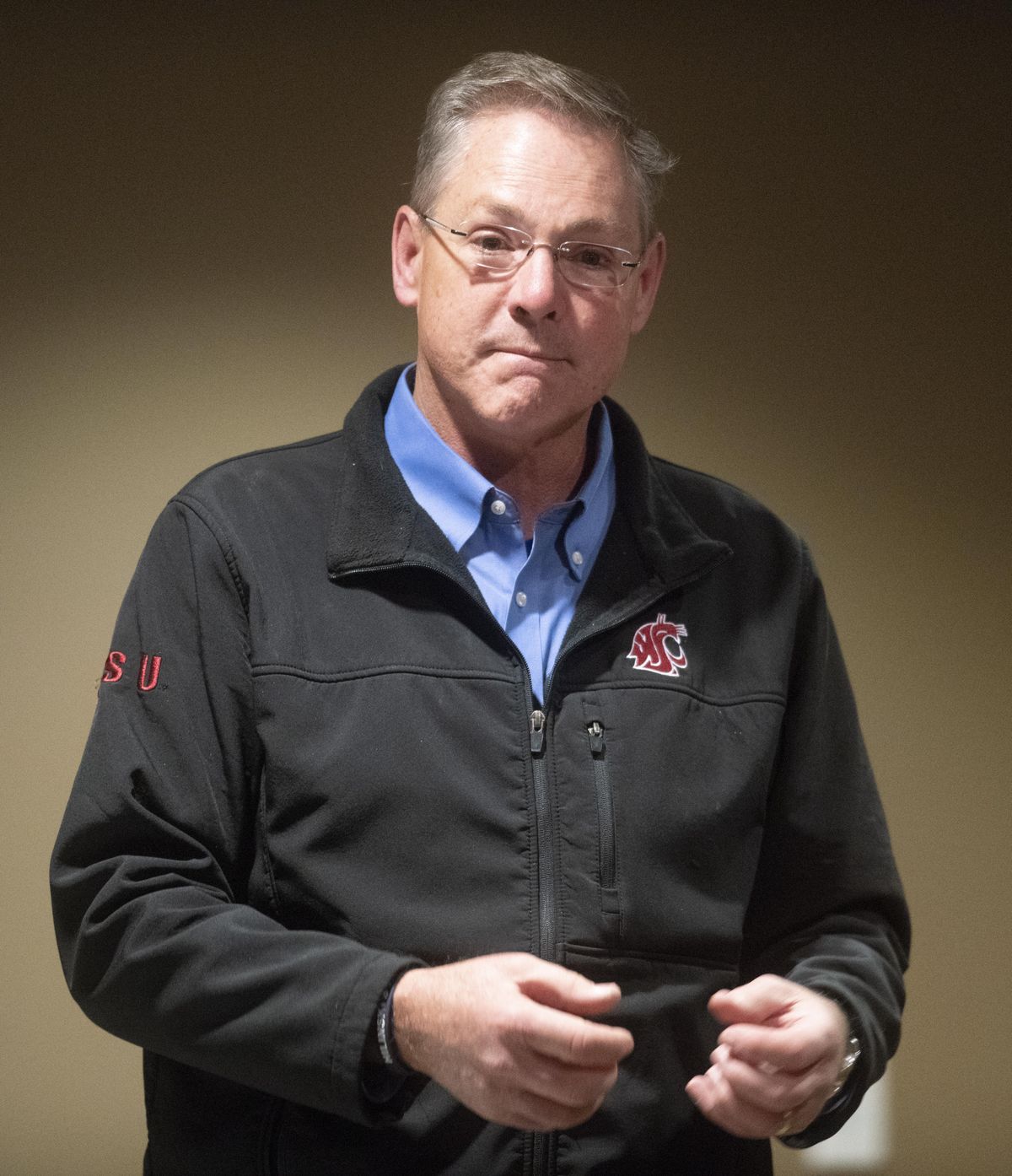Spokane Valley Reps. Matt Shea and Bob McCaslin debate Democratic challengers Ted Cummings and Mary May

Candidates for the two House positions representing the 4th Legislative District shared vastly different views on health care, organized labor, immigration and other issues during a pair of debates Tuesday evening hosted by the Greater Spokane Valley Chamber of Commerce.
The debates at the CenterPlace Regional Event Center pitted two Republican incumbents against their Democratic challengers. Rep. Matt Shea faces Ted Cummings, a Kaiser Alumimum employee and member of the Steelworkers union, while Rep. Bob McCaslin faces Mary May, a former Spokane Valley city planner and regulatory consultant.
The moderator was Michael Cathcart, who leads the business-focused Better Spokane political action committee. During the first debate between Shea and Cummings, some of the most impassioned arguments followed a question about universal health care.
“Universal health care is absolutely a failure. It has been always,” Shea said, before mentioning his wife, an immigrant from Ukraine. “When I talk to my wife about being under universal health care in the Ukraine in the former Soviet Union, she was pretty clear about it. It makes not just everybody poor, but it also makes everybody have the lowest level of treatment.”
Cummings said there should be a public health care option for anyone who can’t afford private insurance.
“Our wages aren’t keeping up with health care, and it’s wrong to give someone a deductible that’s so high that health care is virtually unusable and worthless,” Cummings said. “Let’s get over the fact that it sounds like a socialist plot and do something good for one another and your neighbors.”
Shea responded: “Well, it is socialism because that’s what the proponents have admitted.”
Another question was about the Supreme Court’s so-called Janus decision, which was handed down in June and deems it unconstitutional to force public sector employees to pay union dues.
“I’m a Steelworker, I’m a union representative and I completely disagree with right-to-work and the Janus decision and all that,” Cummings said. “If you want to see how that works, just go next door to Idaho, and you can watch all those people from Idaho stream across and take Washington jobs, good-paying Washington jobs.”
Shea, who has introduced legislation that would have weakened labor unions, had a very different response.
“I think the Janus decision vindicated my bill on right-to-work, particularly regarding public-sector unions and the fact it’s unconstitutional to force somebody to belong to an organization that they don’t want to,” Shea said. “To say otherwise, quite candidly, is un-American.”
In a closing statement, Shea told the small crowd of local business leaders he would cut taxes and regulations, protect their right to bear arms and defend their “religious liberty” and “Christian heritage.”
“As a veteran who’s had over 100 hours of counter-terror training, we need to acknowledge the threats that are out there, too,” Shea said. “But we need to unite as Americans and stop the divisive rhetoric that’s out there.”
Shea founded a local chapter of the anti-Muslim group ACT for America and has recently attempted to tie a Spokane Valley mosque to the Muslim Brotherhood. He’s also been a champion of the far-right movement to turn Eastern Washington into a 51st state called Liberty, though he did not mention that part of his agenda during Tuesday’s debate.
Cummings, meanwhile, was eager to bring it up.
“We need to come together and work on our infrastructure, education, housing, homelessness and all those things,” Cummings said. “We can’t be focused on a 51st state, or ‘deep state’ conspiracy theories, or paranoia, or singling out which religious group is a threat, and who’s deserving and who’s not. That tears us apart, and that destroys trust in one another.”
McCaslin and May were asked many of the same questions during their debate. One point of obvious disagreement was renewable energy: May said the state should invest more in green research and development, while McCaslin said he could not support such legislation until more forest management is done to prevent wildfires, which produce enormous amounts of greenhouse gases.
The Democratic candidates face uphill battles in the deep-red 4th District, which covers Spokane Valley and a northeast portion of Spokane County. In the August primary, Shea led Cummings with 57 percent of the vote, while McCaslin led May with 61 percent.
Ballots were mailed last week for the Nov. 6 general election.